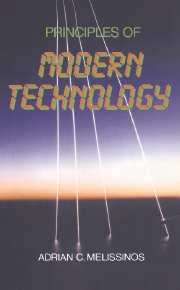Part D - Space travel
Published online by Cambridge University Press: 03 December 2009
Summary
Transportation, of people and materials, is among the major factors that have made our civilization possible. The harnessing of animals and the use of ships were exploited early in the history of man. The sailing boat was an extraordinary invention because the sea offered reduced friction to the point where the wind would suffice to propel the ship. Railroads provided the freight capacity that made possible the industrial revolution, to be followed by the introduction of the automobile in the 20th century. The first airplane flight by the Wright brothers took place in 1903, and today transportation has brought within easy access all parts of the globe. This speed and ease in transportation has had and continues to have a profound effect in shaping the social and economic structure of the world community. In 1969 man landed on the moon, and unmanned spacecraft have reached to the edge of our planetary system. More ambitious missions into space can be foreseen as technology advances and the desire to carry them out persists.
Chapter 7 is devoted to a discussion of airplane and rocket flight and propulsion. In contrast to ships which are buoyant, airplanes are heavier than air and are supported by the dynamically produced lift. The reduced friction in air allows airplanes to reach high velocities, even in excess of the speed of sound. While airplanes must fly in the atmosphere, rockets are not subject to such a restriction.
- Type
- Chapter
- Information
- Principles of Modern Technology , pp. 239 - 240Publisher: Cambridge University PressPrint publication year: 1990



